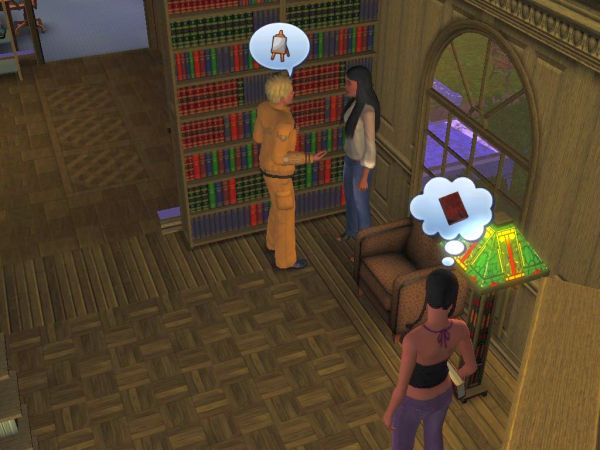
Dogpile! From the online game City of Heroes.
I am not talking about online chess or Online Go, which are like their offline versions. I am sure better men than I have evaluated their ethical standing. If not, I would just say that if you are a sore loser or a triumphant winner, you should consider not playing even these unless you are a child. It is OK for children to experience a wide range of emotions so they can learn, since they hopefully have parents or guardians to contain them and help them back to balance. For adults, to be brought out of balance by a game is shameful and should give grounds for self-reflection.
What I want to write about, however, is the current popular breed of multiplayer roleplaying games like World of Warcraft, Dark Age of Camelot, or City of Heroes/City of Villains. In these games, you take on the role of a character, almost always a fighter of some kind (there are also healers, but these go along with the fighters into battle and are targeted by enemies as well).
In some cases, the very name of the online game hints at the atmosphere: Nobody would want to spend their real life in a dark age, or a world at war, or a city of villains.
Fighting is the main appeal of these games. And not an abstract battle of anonymous pieces, like in chess. It is man against man, or at least team against team. While some games allow you to craft weapons or even grow crops, it is safe to say that the heart of these games is the fight to the (temporary) death.
The game would obviously not last very long if death was permanent, so a main difference from the real world is that you return to life with only a small penalty, which varies from game to game. It could be loss of experience points, gold or equipment, but in any case it is only a minor setback. As such, you are not actually killing the opponent’s character, only inconveniencing them. Still, it is generally referred to as killing, which it symbolizes.
In some games, your character can kill anyone and be killed by anyone. In others, the world is organized into two or three competing kingdoms, and you can only kill foreigners. This is more similar to war than murder, but it is still mostly undertaken in small groups of 6-8 players, although sometimes several groups band together for a raid.
In many games there are also servers or at least zones without “player killing”. Instead you have only “PvE”, “Player vs Environment”, in which you fight against computer-controlled opponents. These may look human or otherwise, but you cause no insult to actual real-world humans by defeating them. You may fight these imaginary enemies alone or in groups with other human players. In some games you can also have computer-controlled pets or servants that fight together with you.
By now we should have a pretty good idea of the ethics involved. Let us first measure our actions against the golden rule. Would you want others to do this unto you? In other words, can you put yourself in your opponent’s shoes? My observation is that people get very upset when defeated by a human opponent, and yet they persevere in doing it to others. So yeah, that is a definite danger zone.
You may argue that you would never kill anyone in real life, but you ARE causing emotional upheaval to real people over the Internet. And you are doing so by going through the motions of killing a humanoid character, which has a quite different flavor from beating someone in a game of checkers or a sports competition. I can see this from the intense reaction of the victims: Curses and profanity abound in PvP zones, and threats that are not always restricted to the game. Clearly the opponent really feels hated.
In short, you are adding to the total of suffering in the world, and as such I am bound to advice against it. This is not what we were born for. Or born again for, as the case may be.
There is another element to it, and that is what you do to your own soul. Let us consider the fate of the soul upon death. It is common in western religion to see the further reward or punishment of the soul as imposed by a foreign will. Basically this guy, God, sits on a throne and decrees your fate. As such, he can be reasoned with, at least by paid experts, so that you can go to Heaven even if you don’t fit in there at all. Indeed, you may not even enjoy Heaven unless you get a brain transplant first, which kind of defeats the point of going there in the first place. If someone else arrives there with your name, it is not much to pop the champagne for.
Buddhism and some parts of Christianity have a somewhat different view. The afterlife is not decided by God’s personal opinion, but on the objective measure of what your soul is like at the time of your passing.
In a manner of speaking, the afterlife is indeed like a virtual reality, in that you are unberthed from your body and all things familiar and thrown into a world of the soul. (Unless, as Jehovah’s Witnesses believe, you simply wake up later in a newly resurrected body. Would be nice, but you still don’t get back to the life you lived. It will anyway be a new and different world.) Now, if you have trained yourself to see life as an ongoing fight for your very existence, to see any stranger as a potential enemy, and you golden rule has become “do unto others as they would do unto you, and do it first”… Now, if God does not put you on a fast train but simply let you gravitate toward the afterlife where your soul naturally belongs… Not a good scenario, is it?
Approximately ten years ago, I used to play the computer roleplaying game Daggerfall daily. It was not an online game, so we always knew that the innumerable opponents were computer-generated. Even so, on an online group dedicated to the game, one of the players mused that perhaps we would go to Daggerfall when we died. He did not seem to think this was a bad thing, and it is indeed a world of amazing possibilities, filled with magic and wonders. Even so, I can think of better fates, due exactly to the constant threat of violence and murder.
At the time, I did not think it possible that we could actually go to Daggerfall after our death, of course. Now I am less sure. In Christianity, as it is commonly understood, there is only Heaven and Hell. But Jesus says that “in my Father’s house there are many rooms” [or even “mansion” in some translations], and also that there are different degrees of punishment for those worthy of that. Given the psychic energy that thousands of people pour into computer games, it is not entirely beyond the pale that a psychic realm – a world of the soul – may be created to accommodate those souls who feel more at home there than in the ordinary world.
In the Judeo-Christian creation myth, God placed the Tree of Knowledge in the Garden of Eden, even though it could at the time only bring ruin to mankind. This was not an act of cruelty, but a symbol that to God, freedom is more important than life. If they were willing to trade eternal life for knowledge of evil, then so be it. If God still has the same mindset of valuing the freedom of the soul, it is not entirely unthinkable that those who freely choose an imaginary realm of strife will also go to an imaginary realm of strife after their tenure in the flesh has ended.
In any case, there will not be Player vs Player in Heaven, I am quite confident of that. In Valhalla, though…









